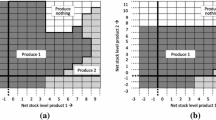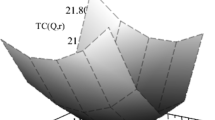Abstract
We consider a two-stage, pull-type production/inventory system with a known service mechanism at the first stage. Set-ups and start-ups are involved in the operation of the second stage. We develop a production control policy for the second stage, within the class of (R, r) continuous-review policies, that minimizes the long run average total cost. We use a semi-Markov decision model to obtain an optimal policy for the operation of the second stage. The structure of the optimal policy suggests the use of a suboptimal look-back policy that delays the set-up at the second stage if the buffer lacks sufficient raw material. The performance of the system and the average total cost under the suboptimal policy can be obtained approximately using a decomposition algorithm. We show examples justifying the use of this suboptimal policy.
Similar content being viewed by others
References
T. Altiok and R. Ranjan, Analysis of production lines with general service times and finite buffers: A two-node decomposition approach, Eng. Costs Prod. Econ. 17 (1989) 155–165.
T. Altiok and R. Ranjan, Multi-stage, pull-type production/inventory systems, Technical report, Dept. of IE, Rutgers Univ. (1991).
G. Bitran and L. Chang, A mathematical programming approach to a deterministic kanban system, Manag. Sci. 33 (1987) 427–441.
C. Bell, Characterization and computation of optimal policies for operating anM/G/1 queueing system with removable server, Oper. Res. 19 (1971) 208–218.
J. Bard and B. Golany, Determining the number of kanbans in a multi-product, multi-stage production system, Int. J. Prod. Res. 29 (1991) 881–895.
J. Buzacott, Queueing models of kanban and MRP controlled production systems, Eng. Costs Prod. Econ. 17 (1989) 3–20.
A. Charnes and W.W. Cooper, Programming with linear fractional functionals, Naval Res. Log. Quarterly 9 (1962) 181–186.
Y. Dallery, R. David and X.L. Xie, An efficient algorithm for analysis of transfer lines with unreliable machines and finite buffers, IIE Trans. 20 (1988) 280–283.
C. Derman, On sequential decisions and Markov chains, Manag. Sci. 9 (1962) 16–24.
Y. Dallery and Y. Frein, On decomposition methods for tandem queueing networks with blocking, Oper. Res. 41 (1993) 386–399.
S.B. Gershwin, An efficient decomposition algorithm for unreliable tandem queueing systems with finite buffer, in:Proc. 1st. Int. Workshop on Queueing Networks with Blocking, eds. H. Perros and T. Altiok (North-Holland, 1989).
L. Gun and A. Makowski, An approximation method for general tandem queueing systems subject to blocking, in:Proc. 1st. Int. Workshop on Queueing Networks with Blocking, eds. H. Perros and T. Altiok (North-Holland, 1989).
I.S. Gopal and T.E. Stern, Optimal cell blocking policies in an integrated services environment,Conf. on Information Sciences and Systems (1983) pp. 383–388.
D.P. Heyman, Optimal operating policies forM/G/1 queueing systems, Oper. Res. 16 (1968) 362–382.
D.P. Heyman and M.J. Sobel,Stochastic Models in Operations Research, Vol. II: Stochastic Optimization (McGraw-Hill, New York, 1982).
W. Hopp and M. Spearman, Throughput of a constant WIP manufacturing line subject to failures, Int. J. Prod. Res. 29 (1991) 635–655.
U.S. Karmarkar, Kanban systems, Working Paper Series QM8612, The Graduate School of Management, University of Rochester, Rochester, NY (1986).
O. Kimura and H. Terada, Design and analysis of a pull system. A method of multi-stage production control, Int. J. Prod. Res. 19 (1981) 241–253.
D. Mitra and I. Mitrani, Analysis of a kanban discipline for cell coordination in production lines. I, Manag. Sci. 36 (1990) 1548–1566.
M.F. Neuts,Matrix-Geometric Solution in Stochastic Models (Johns Hopkins University Press, Baltimore, 1981).
S. Ross,Applied Probability Models with Optimization Applications (Holden-Day, San Francisco, 1971).
K.W. Ross and D.H.K. Tsang, Optimal circuit access policies in an ISDN environment: A Markov decision approach, IEEE Trans. Commun. COM-37 (1989) 934–939.
P.J. Schweitzer, Iterative solution of the functional equations of undiscounted Markov renewal programming, J. Math. Anal. Appl. 34 (1971) 495–501.
R. Serfozo, An equivalence between continuous and discrete Markov decision processes, Oper. Res. 27 (1979) 616–620.
M. Sobel, Optimal average cost policy for a queue with start-up and shut-down costs, Oper. Res. 17 (1969) 145–162.
K. So and S. Pinault, Allocating buffer storages in a pull system, Int. J. Prod. Res. 26 (1988) 1959–1980.
H.C. Tijms,Stochastic Modeling and Analysis: A Computational Approach (Wiley, Chichester, 1986).
P. Zipkin, A kanban-like production control system: Analysis of simple models, Technical Report 89-1, Business School, Columbia Univ. (1989).
Author information
Authors and Affiliations
Additional information
This research is supported by the NSF Grant No. NSF-NCR-9110105, NSF Grant No. NSF-DDM-9014868 and by the North Atlantic Treaty Organization Grant No. NATO-CRG-900580.
Rights and permissions
About this article
Cite this article
Baykal-Gürsoy, M., Altiok, T. & Danhong, H. Look-back policies for two-stage, pull-type production/inventory systems. Ann Oper Res 48, 381–400 (1994). https://doi.org/10.1007/BF02024522
Issue Date:
DOI: https://doi.org/10.1007/BF02024522




